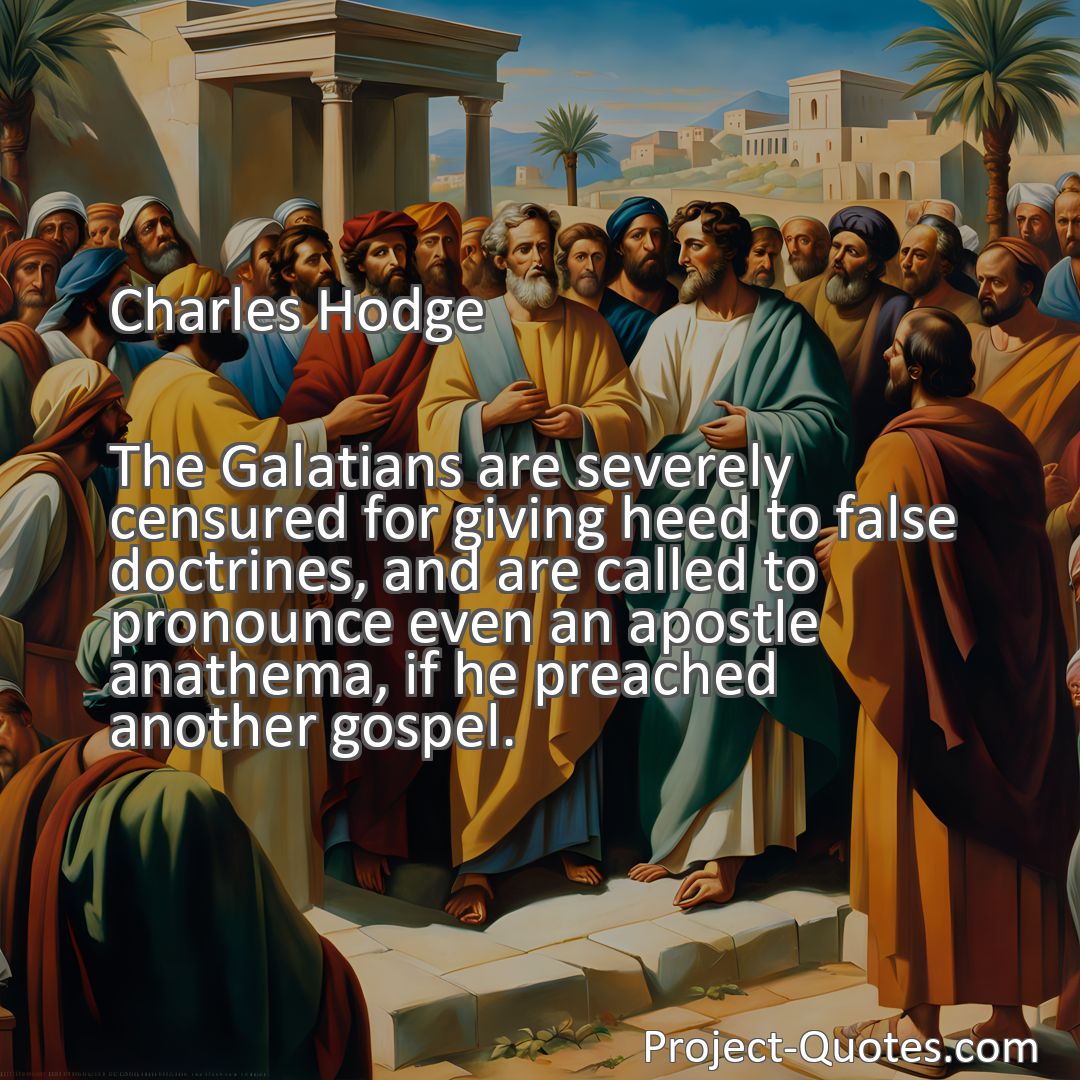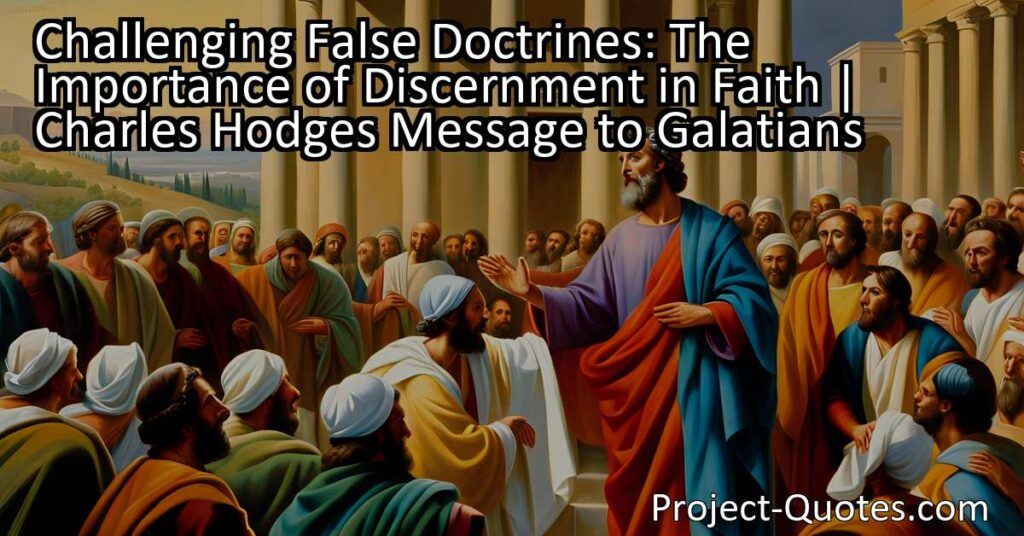The Galatians are severely censured for giving heed to false doctrines, and are called to pronounce even an apostle anathema, if he preached another gospel.
Charles Hodge
Charles Hodge’s message to the Galatians emphasizes the importance of challenging false doctrines that deviate from the core principles of faith. This notion applies not only to historical contexts but also resonates with believers today, encouraging critical engagement with religious teachings and the discernment of truth from falsehoods. By prioritizing the integrity of one’s faith over personal attachments, individuals are called to exercise intellectual inquiry and theological exploration.
Table of Contents
- 1 The Galatians are severely censured for giving heed to false doctrines, and are called to pronounce even an apostle anathema, if he preached another gospel.
- 2 Charles Hodge
- 3 Meaning of Quote – The Galatians are severely censured for giving heed to false doctrines, and are called to pronounce even an apostle anathema, if he preached another gospel.
- 4 Freely Shareable Quote Image
- 5 Related
Meaning of Quote – The Galatians are severely censured for giving heed to false doctrines, and are called to pronounce even an apostle anathema, if he preached another gospel.
In the vast realm of religious teachings and beliefs, it can sometimes be challenging to discern the true from the false. This difficulty becomes even more pronounced when individuals start adhering to doctrines that veer away from the fundamental principles of their faith. In the Epistle to the Galatians, the apostle Paul addresses this very issue, sternly admonishing the Galatians for giving heed to false doctrines and urging them to denounce even an apostle if he were to preach another gospel. This powerful statement, made by the renowned Christian theologian Charles Hodge, speaks volumes about the importance of staying vigilant and holding fast to the core tenets of one’s faith.
The letter to the Galatians, written by the apostle Paul, is an impassioned plea to a group of early Christians residing in the region of Galatia, which is located in modern-day Turkey. Paul had previously preached the gospel to the Galatians, introducing them to the teachings of Jesus Christ and the principles of Christianity. However, after his departure, some false teachers had infiltrated the community, presenting alternative doctrines that deviated from the true message of salvation through faith in Jesus Christ alone.
Understanding the severity of this situation, Charles Hodge, in his commentary on the Epistle to the Galatians, highlighted the Galatians’ duty to reject these false teachings. He emphasized that even an apostle, someone of great authority and influence within the Christian community, should be considered accursed if they preached a doctrine contrary to the one originally delivered by Paul. This notion may seem shocking at first, but it underscores the absolute importance of remaining steadfast in one’s beliefs and not succumbing to deceptive ideologies.
Here, it is crucial to note that the act of anathematizing, or pronouncing someone accursed, does not imply a personal animosity or disdain towards that individual. Rather, it serves as a means of distancing oneself from false teachings and aligning with the truth. By advocating for the anathematization of an apostle who preaches another gospel, Hodge is essentially calling the Galatians to prioritize the integrity of their faith over personal attachments or reputations.
Moreover, this quote sheds light on the challenges faced by early Christian communities in discerning authentic apostolic teachings from deceptive ones. During the formative years of Christianity, various apostles and teachers emerged, each proclaiming a slightly different interpretation of the gospel. This diversity of voices created confusion and uncertainty, making it imperative for believers to exercise discernment and critical thinking when encountering new teachings.
For the Galatians, their predicament stemmed from the introduction of legalism into their faith. False teachers were advocating for the adoption of Jewish customs and rituals, especially the rite of circumcision, as prerequisites for salvation. This departure from Paul’s original message of salvation by grace through faith alone caused him great concern, prompting him to write the letter in an effort to rectify the situation.
Charles Hodge’s recognition of the Galatians’ responsibility to challenge false doctrines extends beyond that particular historical context. It serves as a timeless reminder to believers of the importance of critical engagement with religious teachings. It encourages individuals to develop a deep understanding of their faith, enabling them to discern doctrinal truths from falsehoods and identify deviations from the core beliefs that define their religious tradition.
Additionally, Hodge’s statement fosters an atmosphere of intellectual inquiry and theological exploration. Rather than passively accepting every teaching that comes their way, individuals are called to examine, question, and evaluate the ideas presented to them. This does not mean that one should approach religious teachings with skepticism or disregard for authority. Instead, it encourages believers to exercise intellectual rigor and seek wisdom by engaging with reputable sources, consulting knowledgeable individuals, and relying on scriptural guidance.
In conclusion, the quote by Charles Hodge encapsulates a fundamental principle of faith the need to discern and reject false doctrines, even if propagated by esteemed individuals. The Epistle to the Galatians serves as a poignant reminder of the challenges faced by early Christian communities in navigating the diverse array of teachings. It calls believers to embrace a proactive and discerning attitude towards their faith, urging them to prioritize the truth over personal attachments or external influences. By expanding on Hodge’s quote, we are reminded of the timeless relevance of this message and the importance of remaining steadfast in the core principles of our beliefs.
I hope this quote inspired image brings you hope and peace. Share it with someone who needs it today!


